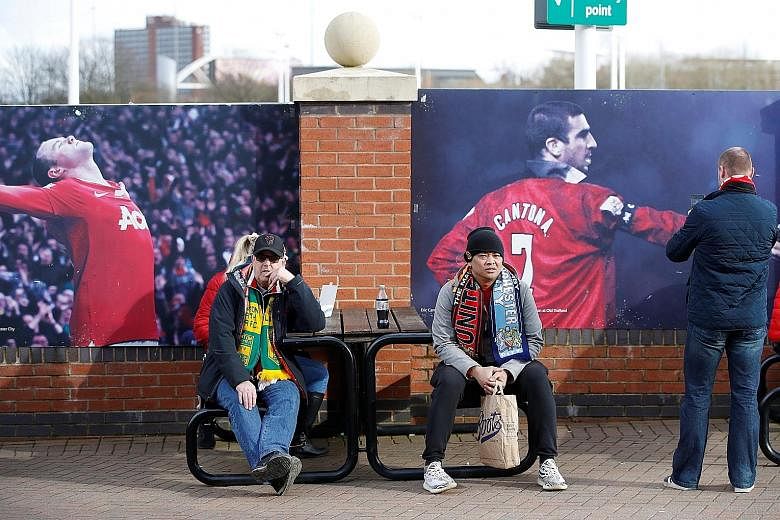The world's richest football league has gotten poorer. How much poorer remains to be seen. The Premier League has outlined one costly consequence of coronavirus: An abandoned season will cost its clubs £1.1 billion (S$1.9 billion).
Complete the campaign behind closed doors and at least television companies will not claim refunds.
Directly and indirectly, everyone in football's ecosystem is adjusting to a new reality and considering the worst-case scenario.
"If the season were cancelled and TV broadcasters were to recoup £750 million of advance payments, that would be very problematic for a number of clubs, particularly outside the big six," said football finance expert Dr Rob Wilson of Sheffield Hallam University. "The broadcast deal alone could put football back five, six if not 10 years."
The most damaging outcome involves the Premier League's principal domestic broadcast partners.
"They are inextricably tied to each other and if one fails, then the other one will struggle as well," Wilson said. He believes it could lead to a smaller television-rights deal.
"There is only a certain point they can go with pausing subscriptions before they have to recover some of the money," he added. "If Sky Sports and BT Sport struggle because they have got no subscribers, Amazon could corner the market for a lower value."
Even assuming that does not happen, football faces financial challenges. Troubled companies will not be sponsoring clubs or players.
"If the recession is as deep as some experts claim, I would estimate a recovery period of a minimum of five years," said Malle Koido, managing director of the Sporting 11 agency.
Football's rude health was overestimated. The 20 Premier League clubs had a combined turnover of around £5 billion last season. Yet almost two-thirds of that was spent on wages - peaking at 85 per cent of turnover at Everton and Bournemouth - and more than half the clubs suffered a loss.
"This pandemic is exposing the fragility of Premier League finances," said Wilson. "We have a hand-to-mouth existence that has been covered up."
-
STANDINGS ACCORDING TO POINTS PER GAME
1 Liverpool* - 2.83
2 Man City - 2.04
3 Leicester** - 1.83
4 Chelsea** - 1.66
5 Manchester United** - 1.55
6 Sheffield United - 1.54 (originally in 7th spot)
7 Wolves - 1.48 (6)
8 Arsenal - 1.43 (9)
9 Tottenham - 1.41 (8)
10 Burnley - 1.34
11 Crystal Palace - 1.34
12 Everton - 1.28
13 Newcastle - 1.21
14 Southampton - 1.17
15 Brighton - 1.00
16 West Ham - 0.93
17 Watford - 0.93
18 Bournemouth*** - 0.93
19 Aston Villa*** - 0.89
20 Norwich*** - 0.72
*Champions
**Qualify for Champions League, if Man City's ban is upheld
***Relegated
"Do I think wages will go down? Yes, probably," said agent Philip Ercolano, CEO of Cassius Sports.
So, everyone agrees, will transfer fees. Those with cash in the bank are in a stronger position.
"A lot of the rich clubs will see it as an opportunity to go and steal the major assets of Championship clubs or overseas markets like France and Portugal," added Ercolano. "In some emerging markets, a £30-40 million player may now be available for £12 million plus add-ons."
There may be other winners. Ercolano outlined: "A free agent coming into their prime, at 24, 25, 26, 27 - they are the new Aston Martin. They have become a real attractive commodity."
Elsewhere, though, he thinks unwanted continuity may be enforced: "Players are going to end up staying at clubs for longer, maybe do an extra season."
Others will be trapped by unaffordable salaries. "Clubs are going to get stuck with loads of players, it is very difficult to get them off the books," Wilson said.
Koido agreed the wealthy are best positioned to survive a crisis: "Some of the small clubs will suffer quite significantly, and may face administration. This crisis is only going to increase economic inequality in football, which is a real shame."
The survivors, in a way, will still pay most. Manchester United's match-day revenue is around £3.5 million a home game. Games behind closed doors come at a cost.
"About half of the Premier League clubs could afford to play with no crowds for a whole season," added Wilson. "Manchester United would be in that bracket."
But, for the other half, social distancing until 2021 could widen the gap between the rich and the rest.












